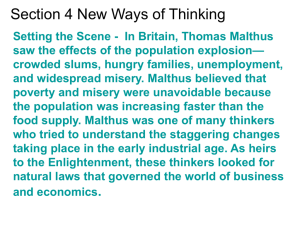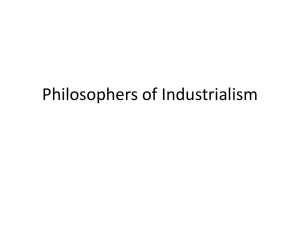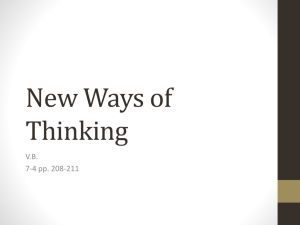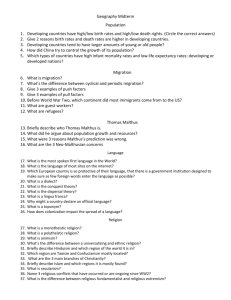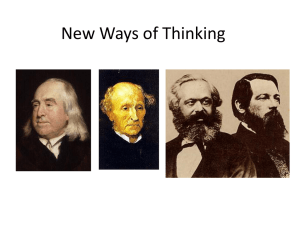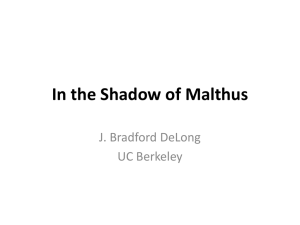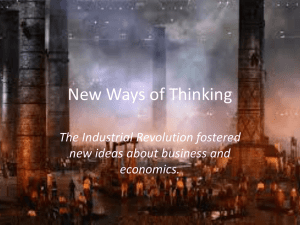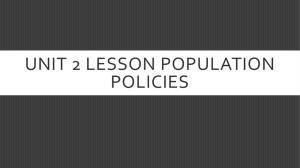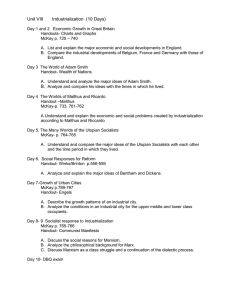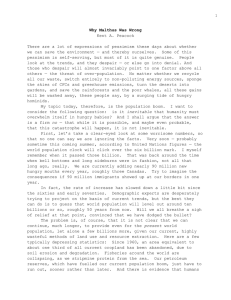Thinkers of the Industrial Revolution Laissez-Faire Economics
advertisement
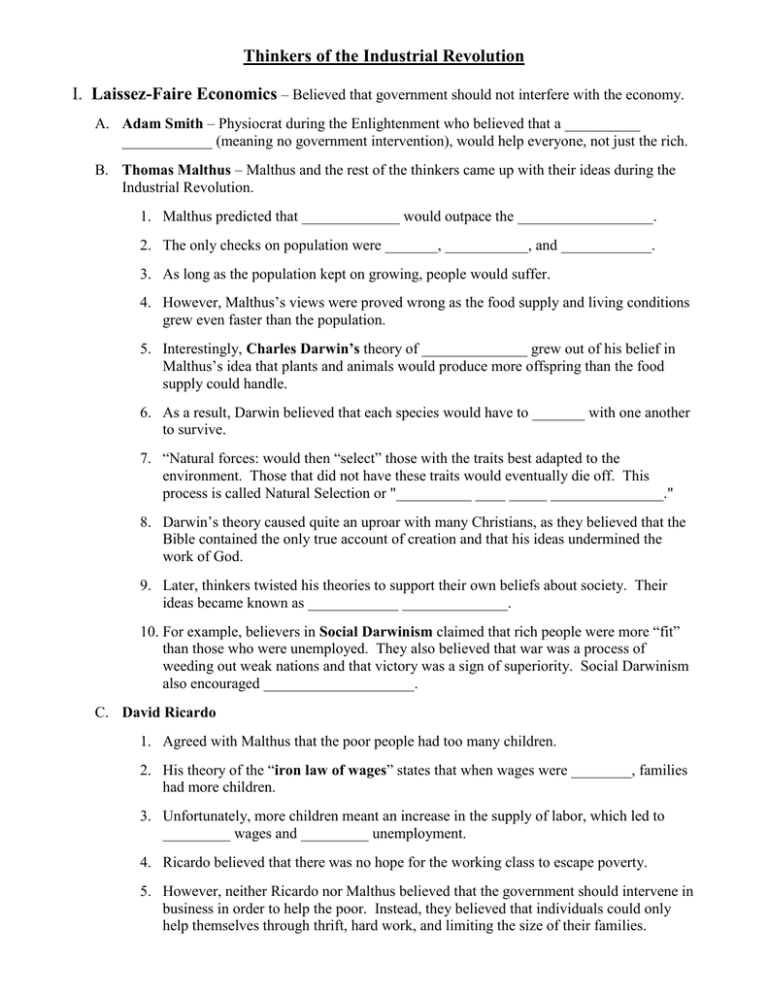
Thinkers of the Industrial Revolution I. Laissez-Faire Economics – Believed that government should not interfere with the economy. A. Adam Smith – Physiocrat during the Enlightenment who believed that a __________ ____________ (meaning no government intervention), would help everyone, not just the rich. B. Thomas Malthus – Malthus and the rest of the thinkers came up with their ideas during the Industrial Revolution. 1. Malthus predicted that _____________ would outpace the __________________. 2. The only checks on population were _______, ___________, and ____________. 3. As long as the population kept on growing, people would suffer. 4. However, Malthus’s views were proved wrong as the food supply and living conditions grew even faster than the population. 5. Interestingly, Charles Darwin’s theory of ______________ grew out of his belief in Malthus’s idea that plants and animals would produce more offspring than the food supply could handle. 6. As a result, Darwin believed that each species would have to _______ with one another to survive. 7. “Natural forces: would then “select” those with the traits best adapted to the environment. Those that did not have these traits would eventually die off. This process is called Natural Selection or "__________ ____ _____ _______________." 8. Darwin’s theory caused quite an uproar with many Christians, as they believed that the Bible contained the only true account of creation and that his ideas undermined the work of God. 9. Later, thinkers twisted his theories to support their own beliefs about society. Their ideas became known as ____________ ______________. 10. For example, believers in Social Darwinism claimed that rich people were more “fit” than those who were unemployed. They also believed that war was a process of weeding out weak nations and that victory was a sign of superiority. Social Darwinism also encouraged ____________________. C. David Ricardo 1. Agreed with Malthus that the poor people had too many children. 2. His theory of the “iron law of wages” states that when wages were ________, families had more children. 3. Unfortunately, more children meant an increase in the supply of labor, which led to _________ wages and _________ unemployment. 4. Ricardo believed that there was no hope for the working class to escape poverty. 5. However, neither Ricardo nor Malthus believed that the government should intervene in business in order to help the poor. Instead, they believed that individuals could only help themselves through thrift, hard work, and limiting the size of their families. II. Utilitarianism – The goal of society should be to provide the greatest happiness for the greatest number of people. A. Jeremy Bentham – Laws or actions should be judged by their __________. i.e. did they provide more pleasure (happiness) than pain? B. John Stuart Mill – Bentham’s chief follower. 1. Mill believed that the government should step in to improve the hard lives of the working class. 2. Believed that workers and women should be given the right to vote so that they could use their political power to win reforms. 3. Did not want drastic change, but did want to see reforms made in some areas such as child labor. III. Socialism – The ____________ as a whole, rather than private individuals, own and operate the “means of production” – the farms, factories, railways, and other large businesses that produced and distributed goods. A. Utopians – Named “Utopians” after Sir Thomas More’s views of an ideal community which he wrote about in his book Utopia. 1. Tried to build self-sufficient communities in which all work was shared and all property was owned by the people. 2. When there was no difference between rich and poor, they believed all fighting would disappear. 3. _____________ __________created a socialist community in New Lanark, Scotland. IV. Marxism and Communism A. Karl Marx – German who lived in London during the Industrial Revolution. 1. Wrote ______ ________________ and The Communist Manifesto. 2. Marxism – a form of __________________ that sees class struggle between employers and employees as inevitable. 3. He believed that there is a constant struggle through history between the “haves” and “have-nots.” The “haves” were the middle-class or ______________________. The “have-nots” were the working class, which he called the ______________________. 4. Eventually, the ____________ around the world would revolt against the bourgeoisie. 5. Then they would form a class-less society in which there was no private property and everybody would have an equal share of wealth and power. 6. His ideas never panned out as a world revolution never occurred and the standard of living of the working class actually improved. 7. Inspired ______________________ – Form of Marxism that believes that the _______________________ should own and operate the “means of production” – the farms, factories, railways, and other large businesses that produced and distributed goods.
